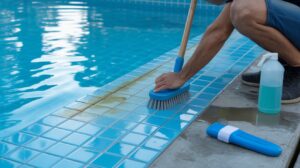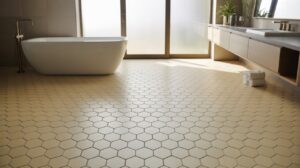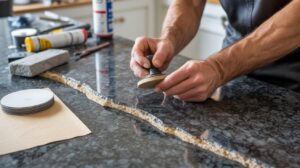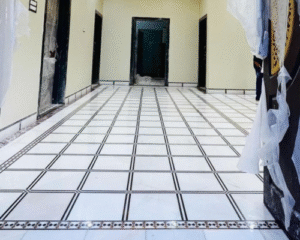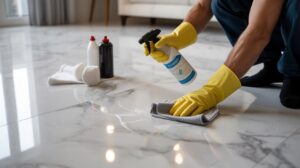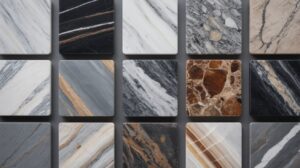How to Clean Marble Countertops
How to clean marble countertops? Marble countertops are a popular choice for many homeowners due to their luxurious appearance and durability. Marble is a natural stone that is formed from limestone, and it is known for its unique veining and color variations. While marble countertops can be a beautiful addition to any home, they need to be cleaned and cared for properly to keep them looking good for a long time.
Proper cleaning and care of marble countertops is essential to prevent damage and maintain their appearance. Marble is a porous stone, which means that it can easily absorb liquids and stains. In addition, marble is delicate to acidic foods and drinks like vinegar and citrus, which can scratch the stone’s surface.
Table of Contents
ToggleTherefore, When cleaning marble and granite countertops, it’s critical to follow the advice of cleaning experts and use the proper cleaning supplies and methods.
A lot of homeowners like marble worktops because of its opulent appearance and dependability.
Marble Countertop Cleaning

To clean marble countertops, follow these steps:
- Gather necessary supplies: Before you begin cleaning, gather all the necessary supplies. You will need a soft cloth, warm water, mild soap, a marble-specific cleaner, and a dry cloth for drying.
- Wipe the surface with warm water and mild soap to begin: Warm water and mild soap should be used to clean the marble countertop’s surface.. Use a soft cloth to avoid scratching the surface.
- After washing with soap, rinse the surface with clean water to eliminate any soap residue, and then thoroughly dry it. Dry the surface thoroughly with a dry cloth to prevent any water stains.
- Polish the surface with a marble-specific cleaner: Once the surface is dry, apply a marble-specific cleaner to the surface. Apply the cleaner evenly to the surface while adhering to the cleaner’s directions using a soft cloth.
- Avoid using acidic or abrasive cleaners: These cleaners should not be used since they can harm the marble’s surface. Avoid using abrasive cleaners like baking soda or scouring pads, as well as vinegar, lemon juice, and other acidic liquids.
By following these steps, you can clean your marble countertops effectively without damaging the surface of the stone. With regular cleaning and upkeep, your marble countertops will stay stunning for many years.
What Do You Clean Marble Countertops With?
While cleaning marble countertops, it’s essential to use the right cleaning tools to avoid harming the stone’s surface. Here are some tips on what to use and what to avoid:
Recommended Cleaning Products
- Use a pH-neutral cleaner specifically designed for marble. These cleaners are gentle and effective at removing dirt and grime without damaging the stone.
- Look for cleaners that contain sealer, which can help protect the marble from stains and damage.
- Microfiber cloths are recommended for wiping down the surface of the marble, as they are gentle and won’t scratch the surface.
Avoiding harsh chemicals and acidic cleaners
- Avoid using harsh chemicals, such as bleach or ammonia, on marble countertops. These chemicals can etch the surface of the marble and cause it to lose its shine.
- Avoid using acidic cleaners, such as vinegar or citrus, as these can also damage the surface of the stone.
Avoid using harsh cleaning tools like steel wool or scouring pads since they can damage the marble’s surface.
Natural Cleaning Alternatives
- If you prefer to use natural cleaning products, there are several options that are safe for marble countertops.
- A solution of warm water and mild dish soap can be effective at cleaning marble surfaces without causing damage.
- A paste made of baking soda and water can be used to help clean the marble’s surface of dirt and stains.
How to Clean Marble Countertop Stains
Because marble is a porous material that readily absorbs stains, it is crucial to deal with any stains as soon as they appear on a black marble countertops. Here are the steps to clean marble countertop stains:
- Determining stain types: You must first determine the sort of stain that is on a marble countertop in order to remove it successfully. Common types of stains on marble countertops include oil-based stains, water stains, and organic stains such as coffee or wine.The kind of poultice you need to apply to remove the stain depend on the stain’s nature.
- Making and using a poultice: A poultice is a mixture of a cleaning chemical and a thickening agent, like flour or baking soda, that is applied to the stain and allowed to sit for a while.
Apply the poultice to the stain, making sure to cover it completely.Depending on how severe the stain is, wrap the poultice in plastic and leave it on for several hours or overnight.
- Allowing the poultice to dry and removing it: Remove the plastic wrap after the poultice has dried, then use a plastic scraper or spatula to remove the poultice. Warm water should be used to wash and dry the countertop. You might need to apply the poultice again if the stain is still obvious.
Marble Countertop Care
Preventative maintenance, basic cleaning, and expert cleaning and restoration solutions are all part of the marble countertop care process. Let’s explore these points in more detail:
Preventative Measures to Avoid Damage
To prevent damage to marble countertops, it is important to take certain preventative measures. For example:
- Use cutting boards and avoid placing hot pots or pans directly on the surface of the countertop.
- Clean up spills immediately to prevent stains from setting in.
- Use coasters or placemats to prevent scratches from dishes and glasses.
- On the countertop, stay away from acidic items like vinegar and lemon juice.
- To safeguard the marble and increase its resistance to stains and damage, use a high-quality sealer.
Regular Maintenance and Cleaning Routine
Regular maintenance and cleaning of marble countertops is essential to keep them looking their best. The following advice can help you maintain and clean your marble countertops:
- Use a gentle cloth and warm water to frequently clean the countertop.
- Use a mild soap or pH-neutral cleaner to clean the countertop.
Rinse the countertop thoroughly, then use a soft towel to properly dry it.
- Use a marble-specific cleaner to polish the countertop.
- The marble surface can be scratched if you use abrasive cleansers or scrubbers.
Professional Cleaning and Restoration Options
If your marble countertop has become stained, scratched, or damaged, professional cleaning and restoration services may be necessary. Professional cleaners and restorers have the knowledge, skills, and equipment to effectively clean, repair, and restore your marble countertop. Some of the services they may offer include:
- Deep cleaning to remove stubborn stains and dirt buildup.
- Repairing scratches, chips, and cracks in the marble.
- Polishing and honing to restore the shine and smoothness of the marble surface.
- Applying a new sealant to protect the marble and make it more resistant to damage.
Conclusion
In conclusion, marble countertops are a stunning and sturdy addition to any home, but they need the right cleaning and maintenance to keep them looking good for a long time.
To keep your marble countertops looking their best, it is important to take preventative measures to avoid damage, maintain a regular cleaning routine, and get in touch with professionals cleaning and restoration options when necessary.
FAQs about How to Clean Marble Countertops
Avoid using acidic products on the marble surface since they can etch and harm the surface, such as vinegar, lemon juice, or other citrus goods.Also, avoid using abrasive cleaners or scrubbers that can scratch the surface of the marble.
To clean marble countertops, use warm water and a soft cloth to wipe down the surface. You can also use a mild soap or pH-neutral cleaner. Cleanly rinse the countertop, then completely dry it with a soft towel. The marble surface can be scratched if you use abrasive cleansers or scrubbers.
Baking soda and water should be combined to make a thick paste in order to make a poultice that may be used to remove stains from marble surfaces. Placing plastic wrap over the area after applying the poultice to the stain. After leaving the poultice on for between 24 and 48 hours, remove it and clean the area with warm water and a soft cloth.
Yes, it is recommneed to seal my marble countertopended to seal your marble countertop to protect it from stains and damage. Marble is a porous stone, and sealing it will make it more resistant to liquid absorption and damage.
No, you should avoid using vinegar or bleach on your marble countertop. These substances are highly acidic and can etch and damage the surface of the marble. Instead, use a mild soap or pH-neutral cleaner to clean your marble countertop.
Our Services
Contact Us
- 755 Dutton St. Lowell-MA 01854
- Phone: 978-459-5823
- FAX: 978 459 5827
- smgranite@hotmail.com
Our Blogs
How to Clean Swimming Pool Tiles: A Complete Professional Guide
How to Clean Swimming Pool Tiles: A Complete Professional Guide Cleaning swimming pool tiles is...
Read MoreBathrooms with Hexagon Tile Floors: Style, Function, and Timeless Appeal
Bathrooms with Hexagon Tile Floors: Style, Function, and Timeless Appeal Bathrooms with hexagon tile floors...
Read MoreWondering About: Cost to Repair Crack in Granite Countertop, Here is The Complete Breakdown By Experts
Wondering About: Cost to Repair Crack in Granite Countertop, Here is The Complete Breakdown By...
Read MoreTiling with Natural Stone: A Complete Guide to Choosing, Installing, and Maintaining Your Stone Tiles
Tiling with Natural Stone: A Complete Guide to Choosing, Installing, and Maintaining Your Stone Tiles...
Read MoreTiling Ideas for Small Bathrooms: Transforming your compact bathroom into a stylish and spacious‑feeling sanctuary
Tiling Ideas for Small Bathrooms: Transforming your compact bathroom into a stylish and spacious‑feeling sanctuary...
Read MoreIs Quartzite a Natural Stone? A Complete Guide for Homeowners and Designers
Is Quartzite a Natural Stone? A Complete Guide for Homeowners and Designers If you have...
Read MoreHow to Care for Marble Floor | Cleaning & Maintenance Tips
How to Care for Marble Floor | Cleaning & Maintenance Tips When you invest in...
Read MoreTypes of Natural Stone: The Complete Guide for Homeowners & Designers
Types of Natural Stone: The Complete Guide for Homeowners & Designers People have long loved...
Read More
